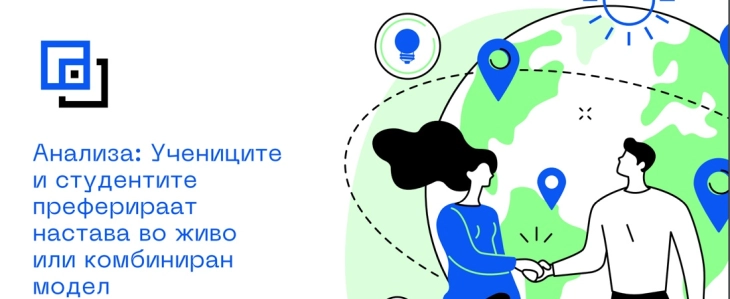Open Balkans countries’ students prefer in-person or combined classes, shows analysis

Skopje, 2 February 2022 (MIA) – Over 70% of the youth in North Macedonia, Serbia and Albania – the Open Balkans countries - don’t want online classes to continue and they believe that they and their professors are not putting in enough effort to make online classes quality, which results in low to mid-tier knowledge and insufficient education, shows an online research conducted by the Institute of Good Governance and Euro-Atlantic Perspectives among students from the three countries over the past month.
The Institute says that the youth’s consensus is that less than 1/3 of them want online classes to go on, with the rest wanting in-person or hybrid classes. Only 14.6% of the youth in Albania prefer online classes, 44% want in-person classes, and 41.4% have expressed a preference for a combined model. 27% of students involved in the online research from North Macedonia want to do online classes, 41% would prefer in-person classes, and 32% prefer a combined model. 21% of Serbian students prefer online classes, 37% prefer in-person, and 42% would prefer a combined model.
According to Bojan Kordalov, communicologist and one of the authors of this analysis, the Covid pandemic caught the education systems in the countries of the region unprepared, but 2 years later, the numbers show we haven’t changed much, nor have we invested enough in building trust in the new technologies and learning methods.
“I personally prefer classes and in-person training, but let me remind you that without technology, many students would’ve lost the school year, and some would’ve had to postpone getting their bachelor or master degrees by a year or two. Technology has prevented this. The quality of classes remains the top challenge. All the participants in this study say they want digital reforms, but according to the needs of the teachers and students. That means there’s no room for improvisation, what there needs to be is an inclusive process that’ll involve and listen to all actors of the educational system,” Kordalov says.
The survey also shows that young people in these countries have tripled their screen time during the pandemic. Before that, if around 40% of participants spent up to or over 3 hours of their day in front of a screen, that number doubled to 80% during the pandemic.
Opinions are divided concerning the quality of online classes, as well as the preparation of teachers to teach in remote learning conditions caused by the Covid pandemic.
On average, a large percentage of young people find their classes to be low quality, with underprepared teachers, who only gave the highest grades to about 20% of students. Young Albanians are the least satisfied, giving their teachers low or average scores, with only 10% believing that they’re doing a good job. In North Macedonia and Serbia, opinions are divided. 30% believe that teachers aren’t ready for online classes, and the same percentage graded their teachers highly.
Students aren’t happy with their own efforts, nor with how much they’ve learned during online classes. 48% of young people in Albania aren’t happy with their knowledge. Over 47% of young people in North Macedonia and Serbia graded themselves higher in this category.
“We can’t go back on digitization, especially not for young generations. Their message is crystal clear: We want to go back to school, with modernized education, with digital tools that will be included in a contemporary education, and adapted to our habits. At the same time, students want the freedom to choose when to attend in-person and online classes,” Kordalov adds, pointing out that the world is changing, and we need to adapt quickly according to the habits and expectations of new generations if we’re going to create functionally and digitally literate generations of people.
In terms of the most used remote learning platforms, the youth in North Macedonia prefers Microsoft Teams and Zoom, Zoom is the platform of choice for young Serbian students, and Albanian students prefer Google Classroom and Meet.
Young people recommend better education and preparedness for their teachers, more student interaction, better use of learning tools. Some of them suggest that lessons are recorded, and for the video materials to be available for all students.
“Generally speaking, most young people in the region think reforms are necessary through digitization of classes, which includes a curriculum made in an interesting way, adapted to the students’ needs. This approach will increase the quality of their knowledge and skills. The encouraging thing is that almost all young people in the region are ready to accept positive changes and innovative learning solutions,” the analysis concludes.
IDUEP’s online research was conducted between January 20th-31st, 2022, in partnership with the Forum of Educational Changes, surveying over 500 students from all three countries. The results and all suggestions will be delivered to the top of the state and governments of all three countries of the Open Balkans initiative. dk/ba/







